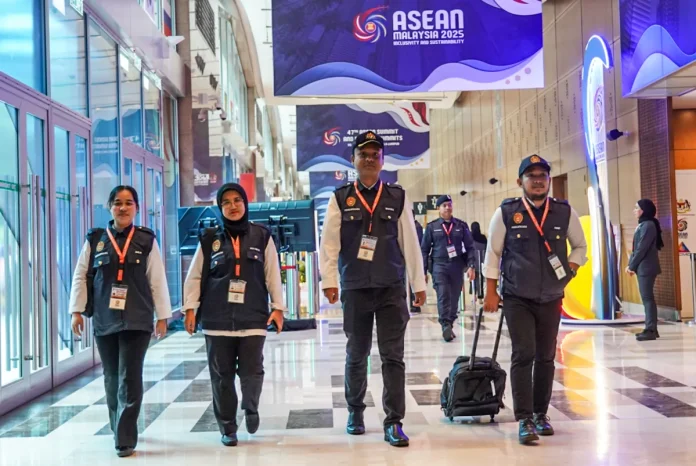Health Ministry deploys 512 personnel to handle 480 cases during ASEAN Summit with stealth precision.
KUALA LUMPUR: While diplomats negotiate and leaders deliberate at the ASEAN Summit, an elite medical force operates in the shadows, ensuring that health emergencies never become headline news.
The Health Ministry’s Medical Protection Unit has managed close to 480 medical interventions since October 21, when the summit commenced, handling everything from common ailments to urgent health situations without causing any disruption to the diplomatic proceedings.
Dr Muhammad Yunus Tauhid Ahmad, Deputy Director of the Health Ministry’s Medical Protection Unit, described the operation as comparable to running a complete hospital within the summit infrastructure.
“We provide comprehensive medical services spanning routine consultations to critical emergency care,” Dr Yunus explained.
“Every patient undergoes our initial assessment protocol, similar to hospital triage. We conduct vital signs monitoring, temperature checks, and when necessary, laboratory testing.”
The medical infrastructure includes two dedicated facilities at the main venue. One serves the general delegation population, while a separate center caters exclusively to Very Very Important Persons, including ministerial-level officials and heads of government.
The VVIP medical center incorporates enhanced security measures and complete confidentiality, equipped with comprehensive emergency capabilities. The facility houses cardiopulmonary resuscitation equipment, airway management tools, cardiac defibrillators, and a full pharmacy of emergency medications.
According to Dr Yunus, the majority of cases have involved minor health complaints such as elevated body temperature, respiratory symptoms, pharyngeal discomfort, and gastrointestinal issues. No critical incidents have occurred thus far.
“We’ve encountered several cardiovascular and respiratory cases, including acute asthma exacerbations requiring hospital referral. Additionally, we’ve treated minor traumatic injuries, including incidents related to motorcade operations,” he noted.
Medical stations have been established at every hotel accommodating international leaders, each offering equivalent standards of care to the main centers.
“Our protocol involves patient stabilization at the point of contact, followed by transfer to Hospital Kuala Lumpur when advanced care is required,” Dr Yunus said.
To guarantee rapid deployment, 30 fully-equipped ambulance units are positioned strategically across summit locations and accommodation facilities.
Each ambulance operates with a five-person medical crew consisting of a specialist physician, a general practitioner, two emergency medical technicians, and a qualified driver. Medical coverage begins immediately upon delegates’ arrival at Kuala Lumpur International Airport and continues throughout their stay in Malaysia.
A Three-Pronged Defense
The Health Ministry has deployed 512 personnel organised into three specialised divisions:
Medical Response Team: Delivers frontline clinical care and emergency medical services at all summit locations.
Food Safety Division: Conducts continuous surveillance of kitchen operations at venues and hotels, verifying food hygiene standards, ingredient quality, and preparation safety.
Public Health Unit: Manages infectious disease surveillance, outbreak prevention protocols, and vector control initiatives, with particular emphasis on dengue prevention.
“These three divisions coordinate seamlessly with logistics and operational teams throughout KLCC and all participating hotels,” Dr Yunus said.
From a centralised command center, the team tracks ambulance deployment in real-time using the Government Integrated Radio Network, enabling coordinated responses to any medical situation.
Dr Yunus emphasised that maintaining discretion represents a fundamental operational principle.
“Our guiding philosophy is straightforward: a medical emergency must remain a non-event from a public perspective,” he stated.
“Even when incidents occur, they should generate zero public or media visibility.”
“Our medical professionals are positioned strategically to enable swift intervention and discreet patient removal, ensuring summit activities continue uninterrupted.”
For highest-level officials, a concealed medical suite has been positioned adjacent to ministerial and head-of-state holding areas. The suite features ultrasound diagnostic equipment, patient monitoring systems, and confidential access corridors.
“If evacuation becomes necessary, we can transport patients directly to hospital facilities through alternative routes without detection,” Dr Yunus revealed.
Planning for the medical operation commenced in early 2024, encompassing equipment acquisition, personnel allocation, supply chain management, and extensive training programmes.
Dr Yunus disclosed that while every foreign delegation arrives with personal medical staff, Malaysian health personnel maintain primary responder status.
“Most international medical teams, including those accompanying leaders such as U.S. President Donald Trump, have specified that Malaysian personnel must lead any emergency response. Their role is primarily observational and advisory,” he explained.
“They’ve demonstrated complete confidence in our capabilities. While this creates significant responsibility, our comprehensive training ensures every delegation receives optimal care.”
“We plan for every conceivable scenario, recognizing that medical emergencies can occur without warning. Our operations reflect this systematic approach,” Dr Yunus said.
“This level of detailed preparation is essential to our mission,” he concluded.
The medical team’s invisible presence at the ASEAN Summit exemplifies Malaysia’s commitment to hosting world-class international events where safety and security extend far beyond visible security personnel to include the silent guardians of health standing ready in the background.











